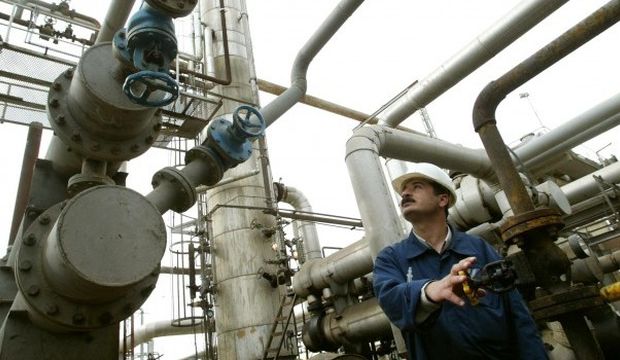
This file photo taken on March 12, 2003 shows an Iraqi Kurd working at an oil refinery in city of Suleimaniyah in the Kurdistan region in Iraq. (AFP Photo/Behrouz Mehri)
Baghdad, Asharq Al-Awsat—Disagreements over outstanding debts are threatening to undermine the agreement signed in late 2014 to end a near year-long oil dispute between the Iraqi government in Baghdad and the government of the country’s autonomous Kurdish region.
Members of the State of Law coalition and the Financial Committee in the Iraqi parliament in Baghdad accused the Kurdistan Regional Government (KRG) of delaying the repayment of 36 trillion Iraqi dinars (31 billion US dollars) worth of oil revenues to the federal government dating back to Nuri Al-Maliki’s two terms as prime minister of the country between 2006–2014.
Meanwhile, Naguiba Naguib, a member of the corresponding committee in the Kurdistan regional parliament, accused Baghdad of not transferring funds owed to the KRG from its share of the Iraqi national budget, which Baghdad cut off early in 2014.
“There is money owed to the Kurdistan region by the federal government in Baghdad, and which they have still not paid, totaling 45 trillion dinars [41 billion dollars],” she said, calling on Iraqi MPs to stop “making random accusations toward the Kurdistan region, because there is currently an agreement between Baghdad and Erbil which includes the resolution of all disputes between them . . . what is the need for all this talk which inflames the problems yet again?”
Naguib accused the State of Law coalition—whose members made the accusations against Erbil and is led by former premier Maliki—of being “the only ones who reject the agreement with Kurdistan and make wrongful accusations toward Erbil.”
Maliki’s government cut off payment of the Kurdistan region’s 17 percent share of the Iraqi budget and stopped paying the wages of public sector workers in the region in January 2014.
Baghdad said this was in response to Erbil exporting oil independently of Iraq’s state-owned oil company SOMO, but the Kurds insist they only resorted to exporting oil independently of Baghdad as a last option to shore up funds after their money was cut off by the federal government.
But both sides eventually signed an agreement to end the dispute in December of 2014. Baghdad agreed to transfer a sum of 500 billion dollars to Erbil to reimburse it for the funds that had been withheld.
Erbil will now export 250,000 barrels per day (bpd) of oil via SOMO and, in turn, allow Baghdad to export 300,000 bpd from the Kirkuk field via Kurdish pipelines to the Turkish port of Ceyhan port for export to global markets.
Under the terms of the agreement, Kurdistan will also export an additional 150,000 bpd independently of SOMO.
However, both sides said in December a number of issues still needed to be worked out, and resolved to meet again early in 2015 to work out a plan to transfer revenues still owed to either side.
However, the joint committee formed by both governments to oversee the transfers is yet to make any progress on this issue, according to Abdulaziz Hassan, the deputy head of the Kurdistan Alliance, the main Kurdish coalition in the Iraqi parliament.
Speaking to Asharq Al-Awsat, Hassan echoed Naguib’s comments, denying that the KRG was deliberately delaying any outstanding payments to Baghdad.
“It is necessary to create mechanisms to oversee the return of the outstanding payments because there are sums owed by the Kurdistan region to Baghdad that still must be paid, and, in turn, there are funds owed to Kurdistan by Baghdad. All of this needs to be looked into by the joint committee—which is yet to make any announcements on the results of this process,” he said.
The issue is now doubly important to both sides in light of low world oil prices, which have fallen almost 60 percent since last year. As a result of the the price slump the Iraqi cabinet has decided to reduce the recommended oil price in its 2015 budget from 60 dollars per barrel to 55.
Iraq, one of the world’s biggest oil producers, relies almost entirely on oil revenues for its national income and is looking to reinvigorate its oil industry following some gains in its fight against the Islamic State of Iraq and Syria (ISIS).
Iraqi Oil Minister Adel Abdul Mahdi told Asharq Al-Awsat in December the country was looking to raise output to 4 million bpd this year.
